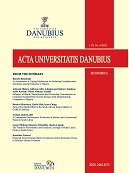Integrated Personnel And Payroll Information System (IPPIS) And Government Recurrent Expenditure In Nigeria
Integrated Personnel And Payroll Information System (IPPIS) And Government Recurrent Expenditure In Nigeria
Author(s): Wale Henry Agbaje, Taye S. AladetanyeSubject(s): National Economy, Business Economy / Management, Labor relations, Human Resources in Economy
Published by: Editura Universitară Danubius
Keywords: Integrated personnel and payroll information system (IPPIS); personnel cost; ghost workers; false wage claims; government recurrent expenditure;
Summary/Abstract: Despite the financial policies on regulations and management of public funds to avoid over spending and mismanagement, government still express worries over the high cost of its employee emolument costs. These worries necessitated the introduction of the integrated personnel and payroll information system (IPPIS), a policy that is expected to help government, plan, manage and make effective budgeting regarding personnel costs from a central purse. In view of this challenge, this study conducted an investigation to examine the effect of integrated personnel and payroll information system on government recurrent expenditure in Nigeria. The study covered 101 Federal Ministries, Departments and Agencies (MDAs) located in Ondo State. The purposive sampling technique was used to select staff of these MDAs working in the Account and Finance, Internal Audit, Store, and Procurement Departments. This was done because these are the staff working directly on the IPPIS. A total of 300 copies of the questionnaire were distributed to these staff. The Cronbach alpha (α) test was used to test for the reliability and validity of the questionnaire. Data collected were analysed using descriptive statistics and the Structural Equation Modeling (SEM) was used to test the significance of the explanatory variable (personnel cost) and the dependent variables (government recurrent expenditure). The findings of the study revealed a significant positive relationship between personnel cost and government recurrent expenditure, with co-efficient of 4.634; P-value 0.004; t-statistic 2.892. The study concluded that the IPPIS policy has significant influence on government recurrent expenditure in Nigeria, as it relates to reducing personnel cost. The study therefore recommended that the policy be upheld and reposition for better performance as it is found to be effective in helping government achieve their intended goals.
Journal: Acta Universitatis Danubius. Œconomica
- Issue Year: 17/2021
- Issue No: 6
- Page Range: 7-22
- Page Count: 16
- Language: English

